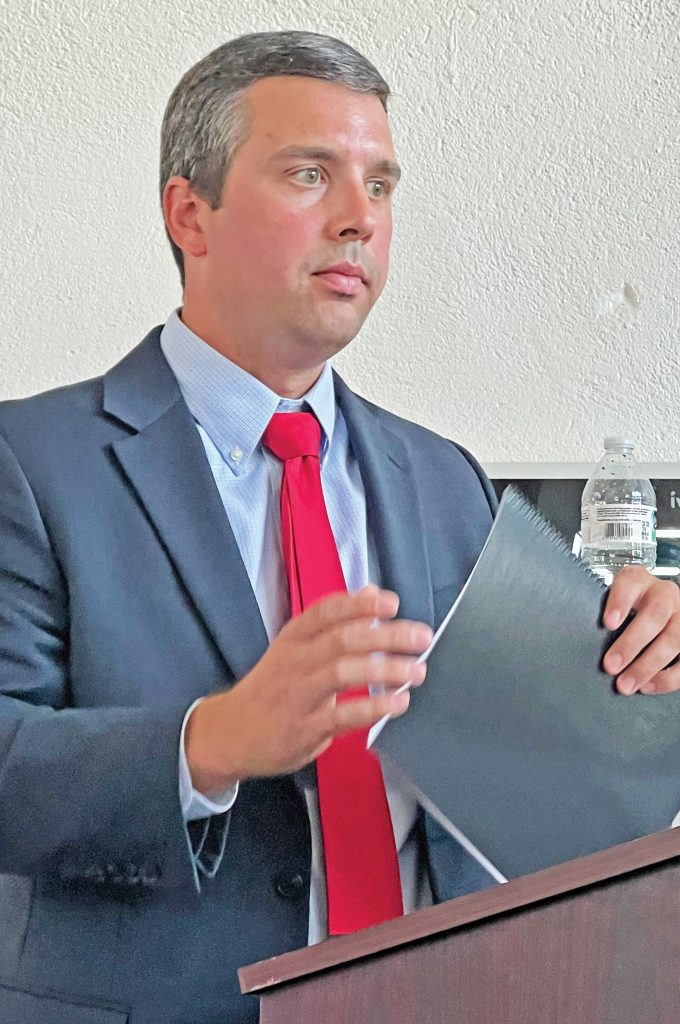WINNSBORO – When an auditor with Mauldin & Jenkins Auditing firm informed Winnsboro Town Council last week that the firm had found a significant deficiency and four material weaknesses in its audit of the Town’s 2023 finances, it didn’t come as a surprise to Town officials.
The findings were the result of a four-month examination of the town’s books that was requested by former Town Manager Jason Taylor in early 2023, less than two years after he was hired.
“While the town had a long record of clean audits, looking at the books, I felt we were trending in the wrong direction,” Taylor said. “I didn’t want to wait till we were over the cliff to find out.
“We were expecting the review of our books to take about three weeks,” Taylor said. “It took four months.”

While rumors swirled that millions of dollars were missing from the Town’s coffers, Taylor says that was not the case.
“The audit showed, instead, that large amounts of money had been misstated as to what was in the accounts,” he said. “For example, a $500,000 grant that had come to the Town was all spent, but it was still on the books.”
“Things like that caused us to think we had more money in the general fund than we actually had,” he said. “But nothing in the audit pointed to theft.”
The audit brought to light the lack of timely annual financial reports; a failure to adopt a budget which balances revenues and expenditures/expenses for each individual fund for which an annual budget is adopted; significant interfund payables within the general fund; and a growing deficit fund balance in the general fund.
Included in the audit report was a chart of the last five years of general fund revenues, expenditures and transfers from the utilities fund. Every year showed revenues and transfers exceeded expenditures. However, after the 2023 audit, the fund balance reflects a $2.8 million decrease compared to the 2022 audit, and a $5,000 decrease in the general fund.
The combined utilities fund, on the other hand [from which money is transferred into the general fund to pay the Town’s bills], showed an increase in the 2023 audit of around $675,000 as compared to the prior year.
“The Town had been operating on a cash basis which is not how government accounting should be handled,” Taylor said.
Warts and all, Taylor said the Town needed to know everything about its finances in order to chart a course of correction.
In June, 2024, during the audit, Taylor left the Town’s employ to accept the position of Town Manager with the City of Newberry.
The results of the audit that Taylor had set in motion were laid out gingerly by Brian Nicholson to Winnsboro’s new Town Manager Chris Clauson, Mayor John McMeekin and town council members during the Town’s regular council meeting on Aug. 20.
Nicholson began by saying that Mauldin & Jenkins issued an unmodified (clean) audit on basic financial statements, meaning that there were no findings of theft or corruption.
But the audit did reveal four material weaknesses and one significant deficiency in internal control.
Material Weaknesses
Nicholson first explained the four material weaknesses.
In regard to the general ledger and fund accounting, he said the Town failed to maintain and record individual funds for the ARPA (COVID) fund and the fireman’s fund.
“What that means,” Nicholson said, “is that all the activity for those funds was being recorded in other funds, and then multiple adjustments were made to break those out to properly present those funds in the bank statements.”
In regard to segregation of duties, Nicholson said there were multiple overlapping duties between the functions of cash collection and receipting as well as recording and reconciling of other financial cycles, including the accounts payable and customers’ receivables subledgers.
“It’s important to separate those duties so there is no risk of misappropriation of assets or any misstatement as it relates to the financial process,” Nicholson said.
In regard to general accounting matters, the deficiency is that certain accounting, reporting and reconciling procedures were not properly performed and reviewed during the fiscal year.
“This significantly delays the close-out of the Town’s books and getting ready for the audit, ultimately delaying the conclusion and completion for the Town’s fiscal year audit,” Nicholson said.
In regard to multiple restatements of prior year balances, a number of deficiencies were found.
“We had to make multiple adjustments to correct opening balances as they relate to accounts receivable revenues and allowances for uncollectable accounts,” he said. “We also had to make adjustments to correct beginning balances of long-term debt as related to the Town’s revenue bonds and accounts payable accounts.
“Additionally, the Town omitted certain deferred outflows of resources as related to OPEB (Other Post-Employment Benefits),” he said. “The Town also incorrectly reported fiduciary activities as related to the victim’s assistance and fireman’s fund.”
Significant Deficiency
The Town’s most severe finding was the significant deficiency found when the auditors reviewed the Town’s purchasing card policies.
The audit report stated that internal controls and policies should be in place which provide reasonable assurance that an individual cannot misappropriate funds and to ensure the safeguarding of assets against unauthorized acquisition or use as it relates to the Town’s purchasing card usage.
“We noted that the Town was not conducting timely reviews and thorough reconciliations of the individual user purchases,” Nicholson said. “There was a lack of formal approval processes in place to ensure proper purchases were made and that improper purchases were disallowed.
“And there was also a lack of certain supporting documentation for various purchases,” he said.
“Overall, I was pleased the audit came back ‘clean’ and the Town is in a steady financial position,” Clauson said. “The findings are exactly what the Town needs to know to ensure the best policies and procedures are put in place. Changes have already been made to existing procedures and we are continuing to work on the policy amendments.”









